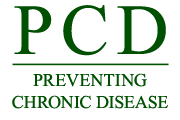PCD News Summary for May 18, 2017

Notice to News Media – PCD Release Time and Embargo Policy:
CDC’s News Media Branch releases to reporters the PCD media packet every Tuesday afternoon between 12 and 2 pm.
Embargoed until Thursday, May 18, at 12:00 PM ET
CDC’s Public Health Surveillance of Cancer
Melissa Newton
mnewton@cdc.gov
404-718-6281
Cancer prevention and control depends on data. In this Centers for Disease Control and Prevention (CDC) report, researchers explain the ways in which CDC collects information about cancer cases, preventive services such as cancer screening, and populations at greatest risk for cancer, and why that data collection is necessary to inform and guide efforts to prevent and control cancer throughout the country. CDC uses surveys and its National Program of Cancer Registries (NPCR) to track cancer in America through its life cycle: from behaviors that may increase risk of getting cancer to diagnosis to treatment and, in some cases, death. The vast data gathered through CDC’s cancer surveillance mechanisms is not just used by CDC to guide its own programs, but also is available for public health partners involved in cancer prevention and control, as well as researchers. Data from CDC public health surveillance of cancer activities are vital to all cancer prevention programs and researchers working to prevent cancer or improve cancer treatment throughout the United States.
###
Note: Not all articles published in PCD represent work done at CDC. In your stories, please clarify whether a study was conducted by CDC (“a CDC study”) or by another institution (“a study published by CDC”). The opinions expressed by authors contributing to PCD do not necessarily reflect the opinions of CDC or the institutions with which the authors are affiliated. PCD requests that, when possible, you include a live link to the article in your stories.
###
U.S. DEPARTMENT OF HEALTH AND HUMAN SERVICES
CDC works 24/7 protecting America’s health, safety and security. Whether diseases start at home or abroad, are curable or preventable, chronic or acute, stem from human error or deliberate attack, CDC is committed to respond to America’s most pressing health challenges.
- Page last reviewed: May 18, 2017
- Page last updated: May 18, 2017
- Content source:



 ShareCompartir
ShareCompartir